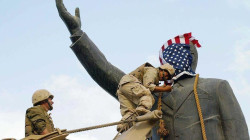U.K. secretary who opposed Iraq's invasion..Robin Cook's suspicious death stirs controversy again

Shafaq News / The sudden "death" of former British Foreign Secretary Robin Cook in 2005 has resurfaced, with suspicions that he died because of his opposition to Britain's - along with the United States - invasion of Iraq.
Robin Cook died of a "heart attack" while climbing mountains in the Inverness region of northern Scotland with his wife Gaynor in 2005, two years after he announced his resignation in the House of Commons in March 2003 because of the British government's position on the invasion of Iraq.
British police investigations showed that Cook's death was natural. Still, they provided little information regarding his sudden death, nor the incident that resulted in him falling from a mountain ridge and breaking his neck, fueling suspicions that he might have been murdered.
According to British media, including The Times of London, his case has reappeared after citizens asked to disclose additional facts about the incident under the Freedom of Information Act. However, the Police have not yet met these demands with transparent collaboration.
Cook, the most prominent leader of Britain's Labour Party led by former Labour prime minister Tony Blair, who made the decision to go to the Iraq war alongside former U.S. President George W. Bush in 2003, has spoken out against the war and resigned in protest. Cook was known for attempting to hold difficult positions that blended as much as possible the interests of politics with his moral values per his pledges to his constituency when Labour defeated the Conservatives in the 1997 election, which many found unsatisfactory.
There were several "conspiracy theories" concerning the circumstances of Cook's death, which occurred when he was 59 years old, but they were not adopted by either his family or friends, and were centered on the concept that security services were engaged in the strange death.
Following the June 2001 elections, Labour triumphed again, and Cook was appointed parliamentary secretary until March 2003, when he resigned in protest over Britain's role in the war in Iraq.
Cook criticized Blair for retaining British soldiers in Iraq and demanded their withdrawal. He even accused Blair of lying to the British people about the war's rationale.
According to the Scottish newspaper, The Herald, one of the most prominent advocates of Cook's murder was former Liberal leader MP Norman Baker, who stated in 2007 that Cook was on British Defence Ministry land when he died, and that he certainly has doubts about what happened.
The Times reported that the Scottish Police had received a request last year from an anonymous person, asking the Police to publish seven detailed information about the circumstances surrounding Cook's death, including the location of the incident, investigations into the former minister's hosts and wife, the way the rescue team behaved, the arrival of the raft, their arrival dates, how police officers investigated, and how they dealt with his wife, Gaynor. This request was rejected at the time.
The Scottish Information Commissioner's Office, on the other hand, stated two days ago that the refusal was a "mistake" because it violated the Freedom of Information Act of 2002, claiming that the Scottish Police were not authorized to reject applications based on repeated requests and urging the Police to reconsider their decision.
According to British media, the Scottish Police have already responded to the anonymous "person's" request for information. Still, other details, such as whether Cook and his wife were carrying a cell phone, have been suppressed. They also declined to reveal whether or not Cook had fallen into a valley.
British media are now recalling that Blair did not attend Cook's funeral at the time, and former Prime Minister Gordon Brown delivered a lamentation at the burial.
Cook's death was "quite comfortable" for the British government at the time, according to an unidentified former politician.
In addition to his opposition to the Iraq war, Cook, known for his stubbornness, was not a supporter of Israel. He frequently denounced its actions toward Palestinians, which drew much condemnation from the media.
He was also one of the most prominent individuals who advocated for NATO to engage militarily in 1999 to prevent Serb forces from continuing their attacks on Kosovo's Albanian minority.



